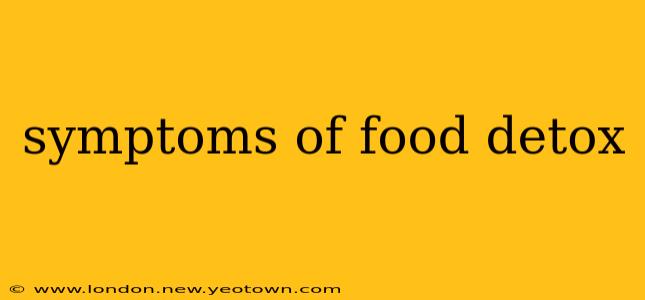Let's be honest, the idea of a "food detox" conjures up images of kale smoothies and days spent sipping lemon water. But what actually happens to your body during this process? The truth is, a "food detox" isn't a medically recognized term, and the experience can vary wildly depending on individual factors like diet, health status, and the specific detox plan followed (if any). However, many people report experiencing a range of symptoms, some positive and some not-so-pleasant. Let's delve into this fascinating, and sometimes challenging, journey.
What are the Common Symptoms of a Food Detox?
The symptoms you experience during a food detox are often your body's way of reacting to the changes you've introduced. These aren't necessarily indicators of a problem, but rather signals that your body is adjusting. Think of it like this: you're essentially resetting your system, and that can involve some temporary discomfort.
Some common symptoms include:
- Headaches: These can stem from caffeine withdrawal (if you're cutting back on coffee or tea), dehydration, or shifts in blood sugar levels.
- Fatigue: Your body needs energy to process toxins, and a detox may initially deplete your energy reserves.
- Nausea and Digestive Upsets: As your body adjusts to the new diet, you might experience some temporary digestive discomfort, such as bloating, constipation, or diarrhea. This is particularly true if you're suddenly eliminating processed foods, sugar, or other common dietary staples.
- Skin Breakouts: This can be due to the body's attempt to eliminate toxins through the skin, or it could be a result of hormonal imbalances as your system adjusts.
- Mood Swings: Changes in blood sugar and nutrient intake can impact mood regulation, potentially leading to irritability, anxiety, or even depression. It's important to note that these are usually temporary.
- Increased Thirst: This is a common sign of detoxification, as your body works to flush out toxins.
Is it Normal to Feel Worse Before Feeling Better During a Food Detox?
Yes, absolutely. Many people report feeling worse before they start to feel better. This is often referred to as a "healing crisis," where your body experiences a temporary surge in symptoms as it works to remove accumulated toxins. This doesn't mean the detox is harmful, but rather that your body is undergoing a significant process.
How Long Do Food Detox Symptoms Usually Last?
The duration of detox symptoms is highly variable. For some, they might only last a few days, while for others, they can persist for a week or even longer. The intensity of the symptoms also differs from person to person. It's crucial to listen to your body and adjust your detox plan if necessary. If symptoms are severe or persistent, it's best to consult with a healthcare professional.
What are the Signs That I Should Stop My Food Detox?
While some discomfort is expected, there are certain signs that you should stop your food detox immediately and seek medical advice:
- Severe headache or migraine
- Persistent nausea or vomiting
- Severe diarrhea
- High fever
- Rapid heart rate
- Difficulty breathing
These symptoms could indicate a serious underlying health issue, and seeking professional help is crucial.
Can a Food Detox Help with Weight Loss?
While some people might experience weight loss during a food detox, it's usually temporary. A sustained healthy lifestyle, which includes a balanced diet and regular exercise, is essential for long-term weight management. Simply eliminating food groups isn't a sustainable solution.
The Bottom Line: Listen to Your Body
Remember, a food detox isn't a magic bullet. It's a temporary dietary change that might help support your overall health, but it's not a replacement for a healthy lifestyle. Pay attention to your body's signals. If you're feeling overwhelmed by symptoms, don't hesitate to adjust your plan or consult a healthcare professional. The key is moderation, balance, and a focus on long-term well-being.

